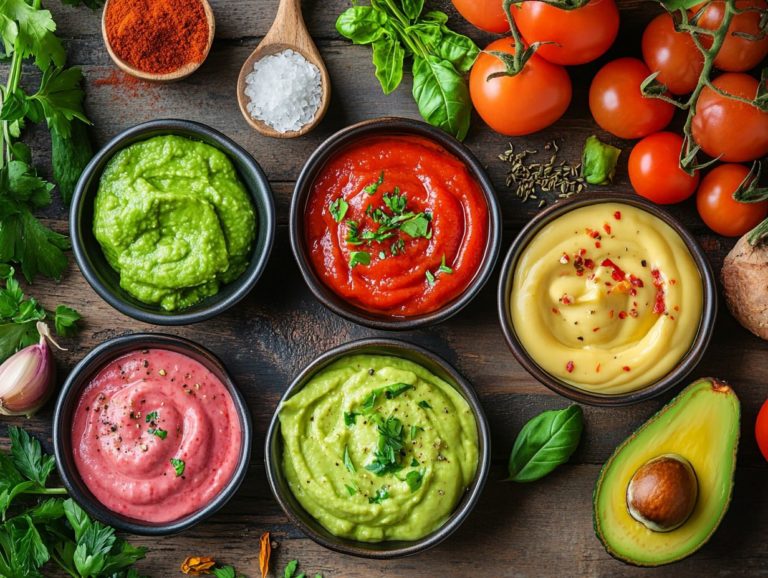How to Balance Your Keto Diet
Are you ready to transform your health with the Keto diet? The Keto diet, also known as the ketogenic diet, has surged in popularity as a low-carb, high-fat eating plan that promises a host of health benefits, from substantial weight loss to improved blood sugar control.
While the allure of its transformative potential is undeniable, it s crucial for you to assess both the advantages and the risks associated with this approach, including its effects on the gut microbiome.
This article delves into the essentials of the Keto diet, highlighting its primary benefits while also addressing possible pitfalls such as nutrient deficiencies and potential heart disease. You ll find practical tips for maintaining a balanced approach that suits your needs.
Whether you re a seasoned Keto enthusiast or simply exploring this lifestyle, there s valuable information here to support you on your journey.
Contents
- Key Takeaways:
- What Is the Keto Diet?
- What Are the Benefits of the Keto Diet?
- 1. Weight Loss
- What Are the Potential Risks of the Keto Diet?
- 1. Nutrient Deficiencies
- 2. Increased Risk of Heart Disease
- 3. Keto Flu on the Ketogenic Diet
- How to Balance Your Keto Diet
- 1. Focus on Whole Foods
- 2. Incorporate Healthy Fats
- 3. Watch Your Protein Intake
- Frequently Asked Questions
- What is a Keto Diet?
- How does a Keto Diet help with weight loss?
- What healthy foods can I eat on a Keto Diet?
- How do I balance my Keto Diet for optimal health benefits?
- Can I still exercise and manage diabetes while on a Keto Diet?
- Are there any potential side effects of a Keto Diet on health conditions?
Key Takeaways:

- Stick to whole, nutrient-dense foods such as avocados, nuts, and seeds on your keto diet to ensure proper nutrient intake and avoid deficiencies.
- Incorporate healthy fats such as olive oil, avocados, and fatty fish into your meals to reach your daily fat intake goals and keep your body in ketosis.
- Pay attention to your protein intake to prevent overconsumption, which can kick you out of ketosis and lead to potential health risks.
What Is the Keto Diet?
The ketogenic diet, often referred to as the keto diet, is a low-carb, high-fat eating plan designed to guide your body into a state known as ketosis. You achieve this by significantly cutting back on carbohydrate intake and replacing it with fats, prompting your body to shift from burning carbohydrates to utilizing fat for energy. This shift is particularly beneficial for managing health conditions like type 2 diabetes and epilepsy.
By prioritizing wholesome foods like avocados, nuts, seeds, and non-starchy vegetables, you aim to boost weight loss and enhance your overall health. Research suggests that this dietary approach can be beneficial for a range of health conditions, including obesity, type 2 diabetes, and heart disease.
What Are the Benefits of the Keto Diet?
The keto diet presents a myriad of benefits that go well beyond simply shedding pounds, which is why it’s become a favored choice among dieters and health enthusiasts alike.
One of the standout advantages of this high-fat, low-carb approach is its remarkable ability to facilitate rapid weight loss by shifting your body’s energy source from carbohydrates to fats. This transformation not only helps in reducing body fat but also positively influences blood sugar control, making it especially advantageous for those managing type 2 diabetes and other health conditions.
Research indicates that the keto diet can significantly boost your cognitive function, offering valuable health benefits for anyone concerned about brain health, heart disease, and epilepsy.
1. Weight Loss
One of the most celebrated benefits of the keto diet is its remarkable ability to promote weight loss. This is primarily due to its unique strategy of slashing carbohydrate intake while ramping up fat consumption. By making this transition, your body can tap into stored body fat as its main fuel, resulting in significant reductions in body fat percentage.
By carefully managing your calorie intake and optimizing your protein intake from sources such as seafood, poultry, and eggs, you can achieve your weight loss goals more efficiently than with traditional diets. When your body enters ketosis, it breaks down fats into ketones, serving as an alternative energy source.
This state encourages fat utilization while helping to suppress your appetite, making it easier to stick to your dietary restrictions. By consuming fewer carbohydrates, you minimize fluctuations in blood sugar levels, stabilizing your hunger cues. A higher protein intake from foods such as poultry, eggs, and seafood supports muscle preservation while enhancing fat burning, creating an ideal environment for sustainable weight loss.
This combination of factors can lead to a more effective fat loss journey, where you find yourself not just shedding pounds but also feeling more energized and less susceptible to cravings. Enjoying keto-friendly foods like coffee, tea, and even chocolate in moderation can also help you stay on track.
2. Blood Sugar Control
Controlling blood sugar is another significant benefit of the keto diet, especially if you are managing type 2 diabetes. By minimizing your carbohydrate intake, this diet effectively lowers glucose levels in your bloodstream, which may improve insulin sensitivity. This can help you manage your health conditions more effectively and potentially reverse the effects of diabetes over time.
The science behind this dietary approach involves cutting back on processed sugars and starchy foods, which can cause dramatic spikes in blood sugar levels. As fats take the lead as your primary fuel source, your body enters a state where it burns fat for energy, further stabilizing blood sugar and minimizing insulin fluctuations. This is particularly beneficial for managing conditions like type 2 diabetes and obesity.
In this state, your pancreas gets a break from the constant demand for insulin. Meanwhile, your liver converts fats into ketones, which are compounds produced when your body burns fat, meeting your energy needs without dramatically impacting your blood sugar. As a result, you may experience fewer cravings and rely less on quick sugar fixes, ultimately fostering a healthier relationship with food and promoting long-term wellness. Be sure to regularly monitor your health through platforms like ZOE to ensure you are getting the full spectrum of health benefits.
3. Improved Cognitive Function
The ketogenic diet has garnered attention for its potential to enhance cognitive function, making it an enticing option for those looking to boost their brain health. This advantage stems from the brain’s remarkable ability to utilize ketones as a highly efficient energy source. Research suggests that this high-fat dietary approach may not only support brain health but also lower the risk of neurodegenerative diseases, underscoring its extensive array of health benefits.
Ketones offer a more stable and efficient energy supply compared to glucose, leading to heightened mental clarity and improved focus throughout your day. Many individuals who embrace this diet often share experiences of enhanced mood and diminished brain fog, which can drastically enhance daily productivity.
Recent studies spotlight the potential protective effects of ketones against cognitive decline, indicating that a ketogenic lifestyle might be especially advantageous for those in their later years. By prioritizing healthy fats while minimizing carbohydrate intake, many are uncovering that this dietary strategy nurtures physical well-being and fosters cognitive vitality.
What Are the Potential Risks of the Keto Diet?

While the keto diet offers numerous advantages, it is important to weigh the potential risks before diving into this high-fat, low-carb eating plan. One key concern is the possibility of nutrient deficiencies, as the diet’s restrictive nature can result in inadequate intake of essential vitamins and minerals typically found in carbohydrate-rich foods like fruits and whole grains.
Some studies suggest that following the keto diet long-term without a careful approach to food choices could elevate the risk of heart disease and other health complications. Be sure to consider these important factors as you navigate your dietary journey. Before starting the keto diet, consult with a healthcare professional to ensure it s the right choice for you!
1. Nutrient Deficiencies
One of the primary concerns surrounding the keto diet is the risk of nutrient deficiencies. By drastically reducing carbohydrates, you may inadvertently limit your intake of essential vitamins and minerals that are abundant in a variety of healthy foods.
While non-starchy vegetables are certainly encouraged, many fruit sources, which are rich in dietary fiber and other vital nutrients, are often eliminated or minimized. If you re not careful, this could lead to health issues stemming from inadequate nutrient intake, potentially affecting your gut microbiome.
To bridge these potential gaps, it s essential to focus on foods that are low in carbs but high in crucial nutrients. Consider incorporating a variety of non-starchy leafy greens, avocados, nuts, and seeds to significantly boost your fiber intake, which is typically compromised in a keto diet.
Consider supplementation with vitamins such as B-complex, vitamin D, and magnesium to address any nutritional voids and maintain a healthy gut microbiome.
Regularly monitoring your micronutrient levels through blood tests can also provide valuable insights, allowing you to make informed adjustments to your diet and supplement choices, ensuring you maintain optimal health while following keto principles.
Incorporating a diverse range of foods such as seafood, poultry, and eggs can also help you meet your nutritional needs.
2. Increased Risk of Heart Disease
Another potential risk associated with the keto diet is the heightened concern regarding heart disease, particularly given the high-fat nature of this eating plan. Some studies have raised alarms about the implications of consuming saturated fats and their potential impact on cholesterol levels.
If not managed properly, this could contribute to heart disease. Therefore, as someone following the keto diet, it’s vital to choose your fats wisely and prioritize heart-healthy options.
This means you should emphasize the consumption of unsaturated fats, such as those found in olive oil, avocados, and fatty fish, instead of saturated fats from sources like butter and red meat.
Research suggests that while the ketogenic approach can promote weight loss and improve blood sugar levels, it may also increase LDL cholesterol, commonly known as ‘bad’ cholesterol.
To monitor these changes, regular blood tests and consultations with platforms like ZOE can provide useful insights.
As you embrace this low-carb lifestyle, you must remain vigilant about your fat choices, as they can significantly affect your cardiovascular health. Regular monitoring of your cholesterol levels and your overall heart disease risk is advisable, empowering you to make informed dietary adjustments as needed.
3. Keto Flu on the Ketogenic Diet
The term “keto flu” refers to the array of symptoms you might encounter when transitioning to the ketogenic diet. As your body adapts to this new energy process, you could experience fatigue, headaches, irritability, and nausea as it shifts from burning carbohydrates to utilizing fat for energy.
While this phase can be quite uncomfortable, rest assured that it s typically temporary as your body adjusts to the dietary changes.
Generally, the keto flu lasts anywhere from a few days to about a week, influenced by your prior carbohydrate consumption and overall health. During this adjustment period, it s essential for you to stay hydrated and maintain your electrolyte levels.
Incorporating foods rich in:
- Potassium
- Magnesium
- Sodium
can help alleviate some of those pesky symptoms. Recognizing that these initial discomforts are a natural part of the transition can empower you to push through, ultimately paving the way for the long-term benefits that the keto lifestyle can offer.
How to Balance Your Keto Diet
Balancing your keto diet is essential for unlocking its full benefits and minimizing potential risks, paving the way for a sustainable approach to healthy eating.
This means prioritizing whole foods like avocados, nuts, seeds, and non-starchy vegetables, which offer vital nutrients and dietary fiber. Incorporating these healthy foods can also aid in weight loss and help manage various health conditions.
It s equally important to embrace healthy fats while keeping a close eye on your protein intake to effectively maintain the metabolic state of ketosis. Staying hydrated and tuning in to your body’s signals are also critical elements of a well-rounded keto regimen.
Are you ready to take control of your health? Share your experiences with the keto diet or consult a healthcare professional before making dietary changes!
1. Focus on Whole Foods
Focusing on whole foods is a fundamental principle of the keto diet. It ensures that you consume nutrient-rich foods that support your overall health and wellness. Foods like avocados, nuts, seeds, and non-starchy vegetables provide healthy fats and are loaded with dietary fiber, essential vitamins, and minerals.
This emphasis on whole foods reduces the risk of nutrient deficiencies while promoting a balanced intake of macro and micronutrients.
Incorporating these whole foods into your daily meals aids in achieving ketosis a state where your body efficiently burns fat for fuel. It also contributes significantly to long-term health benefits. For example, avocados are renowned for their high potassium content, which can help regulate blood pressure. Leafy greens, such as spinach, offer antioxidants that combat oxidative stress.
Nuts and seeds are packed with omega-3 fatty acids, celebrated for their anti-inflammatory properties, making them essential components of your keto journey. These foods can also help manage health conditions like type 2 diabetes and obesity. By prioritizing these wholesome choices, you can enhance your overall lifestyle and stay committed to your dietary goals.
2. Incorporate Healthy Fats

Incorporating healthy fats is crucial to your success on the ketogenic diet. These fats become your primary source of fuel while keeping your carbohydrate intake in check. Foods like avocados, nuts, and certain oils such as olive or coconut oil are excellent choices that not only provide energy but also deliver beneficial nutrients.
By prioritizing these healthy fats, you support heart health and maintain optimal metabolic function. For example, fatty fish like salmon and mackerel are rich in omega-3 fatty acids, known for their anti-inflammatory properties, and they bolster overall cardiovascular health.
To seamlessly integrate these healthy fats into your daily meals, consider starting your day with a breakfast smoothie featuring avocado. You can also drizzle some olive oil over salads or roasted vegetables for lunch.
Snacking on a handful of nuts or stirring in nut butter into your smoothies can boost your fat intake while keeping your meals both satisfying and delicious. For a sweet treat, consider a small serving of dark chocolate to satisfy cravings while staying within your dietary guidelines.
3. Watch Your Protein Intake
Monitoring your protein intake is vital on the ketogenic diet. If you consume too much protein, your body may convert excess amino acids into glucose, disrupting your state of ketosis. Striking the right balance is essential to preserve your muscle mass while keeping your body in that coveted fat-burning metabolic state.
Prioritize high-quality protein sources like eggs, poultry, and seafood to meet your nutritional needs. Integrating moderate portion sizes typically around 20-25% of your total daily caloric intake is key. This method helps maintain a steady state of ketosis and contributes to overall health.
Be mindful of your calorie intake to ensure you meet your dietary needs without overindulging. Consider incorporating fatty fish such as salmon or sardines into your meals; they provide not just protein but also valuable omega-3 fatty acids.
Adding plant-based protein sources like nuts and seeds can enhance your meals while delivering healthy fats. Including a variety of proteins from seafood to poultry ensures you get diverse nutritional benefits.
By being mindful of your protein intake, you can ensure a successful keto journey that enhances your energy levels, sharpens your mental clarity, and supports sustained weight loss.
For additional insights, consider exploring further resources on whole foods and healthy fats to enrich your keto diet!
4. Don’t Forget About Fiber
Fiber is an essential cornerstone of a balanced diet, and it’s vital to recognize its significance even while embracing a diet low in carbohydrates. Adequate dietary fiber supports digestion and gut health, both of which can be thrown off balance by a reduction in carbohydrates.
By incorporating high-fiber, low-carb foods like leafy greens, nuts, and seeds, you can ensure that you maintain regularity and overall well-being on your keto journey. Integrating fiber-rich foods not only bolsters your digestive health but also helps you feel full, which is invaluable when managing cravings while cutting back on carbs.
Foods such as chia seeds, avocados, and broccoli serve as excellent sources of fiber that align perfectly with your ketogenic goals. Increasing your fiber intake can also nurture a balanced gut microbiome, promoting the growth of beneficial bacteria that enhance nutrient absorption and strengthen your immune system.
By making fiber a priority in your keto diet, you can reap the rewards of improved digestion and heightened vitality.
5. Stay Hydrated
Staying hydrated is crucial for your overall health and well-being, especially when you’re following a diet low in carbohydrates. While in ketosis, your body tends to excrete more water and electrolytes, making proper hydration even more important. Adequate water intake not only supports your metabolic processes but can also help alleviate those pesky symptoms associated with the keto flu.
Make it a habit to drink plenty of water and replenish your electrolytes through nutritious foods or supplements to achieve optimal hydration levels. For instance, coffee, tea, and electrolyte-rich foods can be advantageous in maintaining hydration. Remember, this shift can impact your hydration levels!
As you transition into ketosis, it’s vital to recognize that this shift can disrupt your fluid and electrolyte balance, potentially leading to headaches, fatigue, and muscle cramps. To combat these effects, prioritize your water intake throughout the day aim for at least eight glasses. Don’t hesitate to increase that amount if you’re exercising.
Research suggests that maintaining proper hydration can improve overall health and aid in weight loss. Incorporating electrolyte-rich foods like avocados, nuts, and leafy greens into your diet will serve you well. Considering sodium, potassium, and magnesium supplements can provide extra support.
Watch your hydration levels; using visual reminders or hydration apps can simplify the process, helping you stay on track and ensuring your body remains energized and functional throughout your keto journey.
6. Listen to Your Body During Metabolic Changes
Listening to your body is crucial for successfully maintaining a diet low in carbohydrates, as everyone’s response to dietary changes can vary dramatically. By recognizing your body’s signals like hunger, fatigue, and digestive comfort you can make informed dietary choices that help you stay in a state of optimal health and ketosis.
Staying in tune with your body’s needs empowers you to make decisions that align with your long-term wellness goals, particularly in managing insulin levels and preventing type 2 diabetes. Understanding these signals not only aids you in navigating the complexities of low-carb eating but also encourages a more mindful approach to food.
For example, if you find yourself battling unusual cravings or lingering fatigue, it may be a sign that you need more electrolytes or to tweak your fat intake. Likewise, paying attention to your digestive health can help you identify whether certain foods are causing discomfort or obstructing your progress.
By carefully heeding these cues, you can customize your meals to boost your energy levels and enhance your overall well-being, ensuring a sustainable and effective keto experience. Leveraging tools like the ZOE app can help you better understand your body’s responses to various foods and make more informed dietary choices.
Frequently Asked Questions
What is a Keto Diet?

A keto diet, also known as a high-fat diet, is a high-fat, moderate-protein, and low-carbohydrate diet that focuses on putting your body into a state known as ketosis. This means your body will burn fat for energy instead of glucose. It’s effective for managing body weight and certain health conditions like epilepsy and type 2 diabetes.
How does a Keto Diet help with weight loss?
By drastically reducing your carbohydrate intake, your body will switch to burning fat for energy. This metabolic state helps in burning body fat more efficiently.
The high protein and fat content of the diet can help you feel fuller for longer, reducing overall calorie intake and supporting weight loss.
What healthy foods can I eat on a Keto Diet?
Healthy fats like avocados, olive oil, and nuts and seeds; high-quality proteins like fish, chicken, eggs, and seafood; and low-carb vegetables like leafy greens, non-starchy vegetables, and cruciferous vegetables are staples in a keto diet.
Processed and high-carb foods like grains, sugar, and starchy vegetables should be limited or avoided. Including dietary fiber from these low-carb vegetables is also beneficial for your gut microbiome.
How do I balance my Keto Diet for optimal health benefits?
To balance your keto diet, aim for a moderate amount of protein intake, a high amount of healthy fats, and a very low amount of carbohydrates. This will help keep you in a state of ketosis and support weight loss.
Be sure to incorporate a variety of foods rich in nutrients, including non-starchy vegetables, to ensure you are getting all the necessary vitamins and minerals. Research suggests that a well-balanced ketogenic diet can have substantial health benefits and may help manage health conditions such as type 2 diabetes and heart disease.
Can I still exercise and manage diabetes while on a Keto Diet?
Yes, you can still exercise while on a keto diet. However, in the beginning stages, you may experience a decrease in energy and endurance as your body adjusts to using fat for fuel instead of carbohydrates.
Many athletes on a ketogenic diet include foods like coffee and tea to boost energy levels. It is important to listen to your body and make adjustments as needed.
Are there any potential side effects of a Keto Diet on health conditions?
Some people may experience temporary symptoms like the “keto flu” in the beginning stages of the diet, which can include fatigue, headaches, and irritability. These symptoms should subside once your body becomes accustomed to the diet.
Staying hydrated and replenishing electrolytes is crucial to feeling your best on a keto diet. Including foods like nuts, avocados, and dark chocolate can help provide essential nutrients.
Consulting with health professionals or using services like ZOE can provide personalized dietary advice to manage or prevent side effects.






